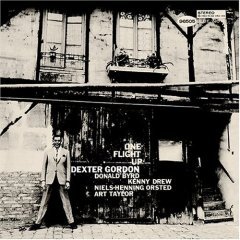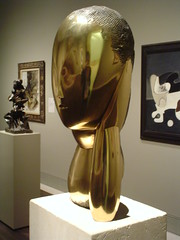1. Louis Armstrong, The Complete Hot Five and Hot Seven Recordings (1925-1929)

Armstrong, as historian Ted Gioia reminds us in his History of Jazz, essentially ushered in the Age of the Soloist in jazz history. This collection (on 4 cds) features many of the early highpoints in his career. As a bebop-favoring late-teenager, I used to think Armstrong's music was corny, but somewhere in my mid-20s I saw the light. I can't listen to "West End Blues" or "Big Butter and Egg Man" now and not be awestruck by the sublime logic of his playing.
2. Miles Davis, Kind of Blue (1959)

I don't think I've ever seen a best-of-jazz list that didn't include this album. It constitutes one of those legendary moments in the history of recorded jazz for its stellar line-up alone: Davis on trumpet, John Coltrane on tenor sax, Cannonball Adderley on alto sax, Bill Evans on piano (with Wynton Kelly, in my mind the greatest accompaniest of the post-bebop era, on one track), Paul Chambers on bass, and Jimmy Cobb on drums. Kind of Blue popularized modal jazz, of course, but it also features one of those rare moments of every musician bringing his best game to the studio. Imagine a pro basketball game in which a team makes no turnovers, perhaps. Everything went right like that here.
3. John Coltrane, Giant Steps (1959)

Most canonical lists, having to choose only one Coltrane recording, would likely cite his magnum opus, A Love Supreme, from 1964. I've always been partial to Coltrane's Atlantic recordings from 1959-1960, though. This is the first flowering of the confident improviser who emerged over the next few years as (in my opinion) the greatest soloist in the jazz pantheon. Coltrane's tone is still bluesy here; his musical vocabulary is becoming increasingly comprehensive; but he'd not yet exploded into the full realization of what Ira Gitler called "sheets of sound." Great writing too: "Giant Steps," "Naima," "Mr. P.C.," "Cousin Mary," all became standards.
4. Duke Ellington, The Blanton-Webster Band (1939-1942)

Much classic Ellingtonia over three discs here. The tunes, dating from the 78 rpm era, are short at under three minutes each, but you'll find many high points from Duke's early mature period represented here: Billy Strayhorn's "Take the A Train," "Concerto for Cootie," "Never No Lament"... This probably isn't my favorite Ellington album (the more anomalous trio session Money Jungle, with Charles Mingus on bass and Max Roach on drums likely holds that honor), but this is certainly the one I would more readily cite for canonical representation, as a definitive marker of Ellington's genius as a composer and bandleader.
5. The Quintet, Jazz at Massey Hall (1953)

Five names: Charlie Parker, Dizzy Gillespie, Bud Powell, Charles Mingus, Max Roach. 'Nuff said. But if you need me to say more, I will say that this isn't the cleanest recording available of Bird and Diz's complementary genius, but it is an important one. If you'd rather just hear Parker, I'd recommend his sessions for Dial. Or for Diz alone, go to his RCA Victor sides.
6. Charles Mingus, Mingus Ah Um (1959)

An accessible introduction to the great rowdy compositions of this post-war genius of the upright bass. Famous numbers from the Mingus book, like "Goodbye Porkpie Hat" (his elegy for Lester Young) and the churchy "Better Get It In Your Soul" are represented here, as is his political anthem, "Fables of Faubus." As you get used to Mingus, though, you'll want to move to more challenging records, like the less restrained records on Candid, or the brilliant, Black Saint and the Sinner Lady on Impulse.
7. Bill Evans, Sunday at the Village Vanguard (1961)

This, for me, is the high water mark for jazz piano in the trio format. Evans's rapport with bassist Scott LaFaro and drummer Paul Motian is legendary. There's never been a more poetic voice on the keyboard, either. He'll break your heart.
8. Thelonious Monk, Monk Alone: The Complete Columbia Studio Recordings (1962-1968)

I'm actually more of a fan of Monk's quartet recordings--especially those with John Coltrane or Charlie Rouse on tenor sax--but hearing this angular, dissonant virtuoso of the piano by himself is a nice way to immerse yourself in his idiosyncratic style. Marvel at the cubist way he approaches familiar tunes; lose yourself in his spaces and tension-building moments of hesitation.
9. Sonny Rollins, Saxophone Colossus (1956)

Call me a trite, but never has an album been more aptly titled. Sonny is a giant. Still.
10. Dexter Gordon, One Flight Up (1964)

Because every jazz collection needs some representation from the amazing Blue Note records catalogue of the 1950s and 60s. And because, as I just said to my partner in the car this morning, no Dexter Gordon record has ever disappointed me. This one is gold just for the epic opener, "Tanya."

3 comments:
Great list! Thanks, too, for correcting my unforgivable omissions of Mingus and Monk. Solo Monk is one of my favorites as well. And the Carnegie Hall disc with Coltrane is fantastic too.
Caleb, thanks.
Yes, the Carnegie Hall disc is a revelation. I also love Monk live at the It club. That's with the Charlie Rouse group. Monk doesn't play a lot on it--he keeps laying out under Rouse's solos--but the band is swinging.
great list. I'm also very partial to 54-64ish (as you can see if you check out my Like a Rolling Pin site.)
About the only thing on your list I don't get excited by is Bill Evans, but I know that you and a lot of other people disagree with me. Otherwise, all music I would happily listen to.
Post a Comment